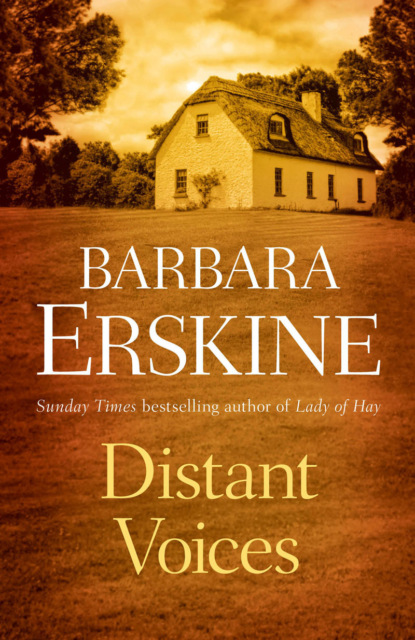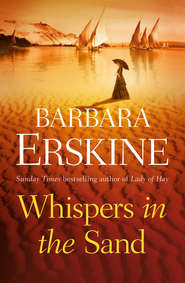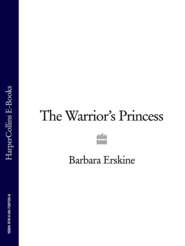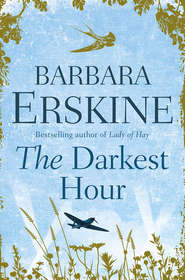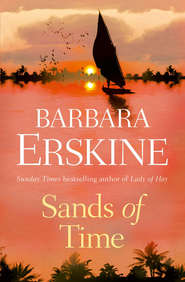По всем вопросам обращайтесь на: info@litportal.ru
(©) 2003-2024.
✖
Distant Voices
Автор
Год написания книги
2019
Настройки чтения
Размер шрифта
Высота строк
Поля
Leaving the shelter of the palace at last she ventured back onto the lawn and, in spite of herself, she found herself looking for Charles. She saw him at once, talking to a group of elderly ladies, and to her chagrin he looked up and caught her eye. For a moment she felt his gaze sweep up and down her body, as if checking her appearance, then infinitesimally he smiled.
Anger erupted in her once more and riding home beside her father in the carriage later she could feel her resentment still seething. But to her relief it appeared that nothing had been said to him about her escapade for he was in high good humour as they trotted through the leafy lanes back to Hancombe, nestling in its fold of the Downs.
‘Tomorrow, Caroline, you and I shall visit the cottage up the Neck,’ he was saying, sure as always of her obedience and her time. ‘I should like to take baskets of food to Widow Moffat and the Eldron family. Poor things, it is two years since Sam worked …’ He broke off suddenly. ‘Caroline, are you listening to me?’
Guiltily Caroline turned to him. Her gaze had been fixed on the crest of the Downs where the golden haze of the afternoon had settled in a shimmering blur on the woods.
‘Of course, Papa. I shall prepare the baskets myself.’
The shadows were running up the valleys between the hills, turning the green of the fields to soft purple beneath the haze. She could smell the rich drift of honeysuckle and roses from the hedgerows on either side of the lane. There was a beauty and a poignancy in the air which soothed her and at the same time unsettled her strangely.
She longed to be alone, away from her father’s strident demands, but it was hours before she was able to escape to the privacy of her bedroom. With relief she closed the door at last behind the maid, Polly, and, drawing her loose wrapper over her nightgown she went to the window and leaned out, staring down at the dusk-shadowed garden. She still felt tense and unsettled; lonely.
It was very hot; the coming darkness was bringing no relief from the heat. If anything it was hotter now. Her mind turned back to the party and the cool freedom of the swing. If Charles Dawson hadn’t found her she could have remained there all afternoon, with the breeze combing its untidy fingers through her hair. Unbidden, a picture of her host’s son floated before her eyes; his tall, stern features, the arrogant smile, the quirked eyebrow when he saw that she had lost her shoe. Almost she had thought he was laughing at her, but then she realised that he must have despised her for being such a hoyden. His own white shirt and silk cravat had been immaculate; not a hair of his head nor his beard was out of place. No doubt he had never sat on a swing in his life.
Slopping some water from the ewer into the flowered basin on her washstand she bathed her face and neck. Then she lay down on the bed. There was no point in thinking about Charles Dawson; no point in thinking about men at all. Lighting her bedside candle she picked up a book and allowed it to fall open.
It was several weeks now since her sister, with a finger to her lips, and a stern warning not to tell their father, had given her the leather-covered volume of Lord Byron’s works and from the day she had first opened it it had become her most treasured possession. Her favourite poem was To Caroline.
‘Thinkst thou I saw thy beauteous eyes …’
She shivered as she read the impassioned words, words she knew by heart she had repeated them so often in the lonely darkness of her room. If only they had been addressed to her.
‘Caroline!’
The abruptness with which her door flew open startled her so much she dropped the book. It slid to the floor with a crash. Her father, still fully dressed, stood silhouetted in the doorway, the candles on the table in the passage behind him streaming in the sudden draught. ‘Caroline, where are my drops? I’ve been calling you!’ His voice, usually so strong, dropped to a whine.
Caroline got up wearily, her feet bare on the cool boards. ‘They are in your dressing room, Papa.’
‘What were you reading?’ His voice rapidly regaining its strength, her father approached the bed and, stooping, picked up her book, staring in curiosity at the gold letters on the spine.
Slowly the colour drained from his face. He held the book out towards her and shook it. ‘Where did you get this … this obscenity?’ he hissed. His voice was tight with anger.
Caroline had gone white. ‘Please give it back, Papa. It is mine –’
‘No!’ He was beside himself with fury. ‘This goes on the fire where it belongs. I don’t believe – I cannot believe that you knew what you were reading! That a daughter of mine should dream of opening such a book –’
‘Papa –’
‘Enough!’ His voice was strident, his need for medicine forgotten.
Caroline clenched her fists. ‘Papa, I am a grown woman, old enough to decide what to read for myself.’
‘No woman under any circumstances should be permitted to read anything that … that monster of depravity has written, Caroline.’ He turned away. ‘I would never have allowed your mother to do so, and I shall not allow you to do so, either.’ At the door he stopped and looked over his shoulder. ‘We shall talk of this again tomorrow,’ he said ominously, and he closed the door.
For several moments Caroline stood still. Fury and indignation vied with sorrow for her beloved book and fear of what her father would do to punish her, grown woman or not. For a moment she blinked back humiliating tears, then galvanised into action by the same streak of rebellion that had driven her to seek refuge from the party earlier she began once more to get dressed.
How dare he!
He dared because he was her father and he knew best.
But he didn’t know best! He had never read Lord Byron’s work, of that she could be almost certain. He, like so many others, was reacting to the unnamed scandals to which her sister with a whisper had hinted. Terrible scandals. What they were she could not guess. And she did not care. Nothing anyone said about him made his poetry less beautiful. Caroline felt the heat of the night caress her languid body as she eased her wrap more loosely around her shoulders. The air had became almost unbearably humid. She pinned her long hair back off her neck in a heavy looped knot and still barefoot, let herself silently out of the room.
The Rectory was in darkness. She padded down the broad staircase and hesitated for a moment at the bottom outside her father’s study door. All was silent within and she could see no light beneath it. He must have gone to bed. Turning she pushed through the door which led to the kitchens at the back of the house. The fire in the range was not damped down as it should have been. It was burning brightly. Peering in she could make out the blackened edge of the binding of her book in the heart of the coals. He had been as good as his word. With a sob she slammed the range door shut.
The key to the garden door was missing from its hook. For several seconds she stared at the empty place in the long line of keys, then again she rattled the door. It was locked fast.
With a sob of anger and frustration she turned and made her way to the front hall. The Rectory was completely silent save for the slow ticking of the grandfather clock in the hall. Cautiously she opened the door into the vestibule and putting her hand on the front door knob she turned it. That door too was locked. She was trapped in the dark, silent house.
Back in her room it was hours before she slept.
At breakfast her father was quick to tell her her fate. He had obviously spent at least part of the night thinking of a suitable punishment for his errant daughter.
‘You have behaved like an irresponsible child, Caroline.’ He put his hand to his forehead dramatically. ‘Yet I cannot believe you knew what you were doing. If I did …’ he paused, shaking his head sadly, ‘I don’t know what punishment would be sufficient, but as it is, I put your sin down to ignorance rather than the intention of knowingly reading such … such filth. Each evening from now on, child, you will read and then learn a passage from the Bible which I shall mark for you, to cleanse and purify your mind.’
Spooning some devilled kidneys onto his plate as he spoke he never looked at her face, never saw the anger and indignation in her eyes. Already he had moved on, to talk of their parish visits, of the Sunday school picnic she was to organise, and of the garden party the day before. It never crossed his mind that she might defy him.
Still seething with anger, she was putting on her bonnet, ready for the first of those parish visits when Charles Dawson was shown unexpectedly into the morning room.
‘Mr Hayward. Miss Hayward. Forgive me. I see that you are about to go out!’
Caroline felt her mouth go dry. So this was it. He was going to tell her father himself about her unladylike behaviour at the party and that would seal her fate. Her father would be convinced of her utter depravity! She felt Charles’s eyes on her, and defiantly she raised her own to meet them.
‘Thank you for your hospitality yesterday,’ she murmured. ‘My father and I enjoyed our visit to the palace so much.’
‘Did you indeed, Miss Hayward?’ His tone was lightly mocking. ‘I’m so pleased. It would have been so easy for one such as yourself to become bored.’
‘Indeed not …’ Caroline replied, flustered, but already her father was interrupting.
‘Oh come, sir, my daughter enjoyed every moment of it, as I did. I have of course already written to your mother to thank her for her hospitality – Charles.’ He hesitated slightly before using the younger man’s first name. ‘Her parties are renowned throughout the county, you know.’
‘Indeed they are.’ Charles bowed and Caroline caught the slightest quirk of his eyebrow. ‘I shall however tell her that you enjoyed yourselves. Particularly you, Miss Hayward. I am sure she will ask you again.’
Was he deliberately taunting her? Trying to keep her intense embarrassment hidden, Caroline glanced at him angrily from beneath her lashes, but his face was bland as he turned back to her father.
‘Forgive me calling so early, Mr Hayward, but I had to be in the area on business and I felt I must call in to say good morning.’ He smiled. ‘It did worry me that Miss Hayward did not seem to be herself yesterday.’
Both men looked at Caroline.
Her father frowned. ‘She seemed all right to me.’
Caroline clenched her fists. ‘Of course I was all right, Papa. I can’t think what Mr Dawson means.’
He was enjoying himself hugely. She was sure of it now.
‘You looked pale, Miss Hayward. Several people remarked upon it,’ he went on solicitously.
‘Did they indeed. How kind of them to comment.’ She could feel herself growing more cross and agitated by the second. ‘If so, it must have been because of the heat.’





